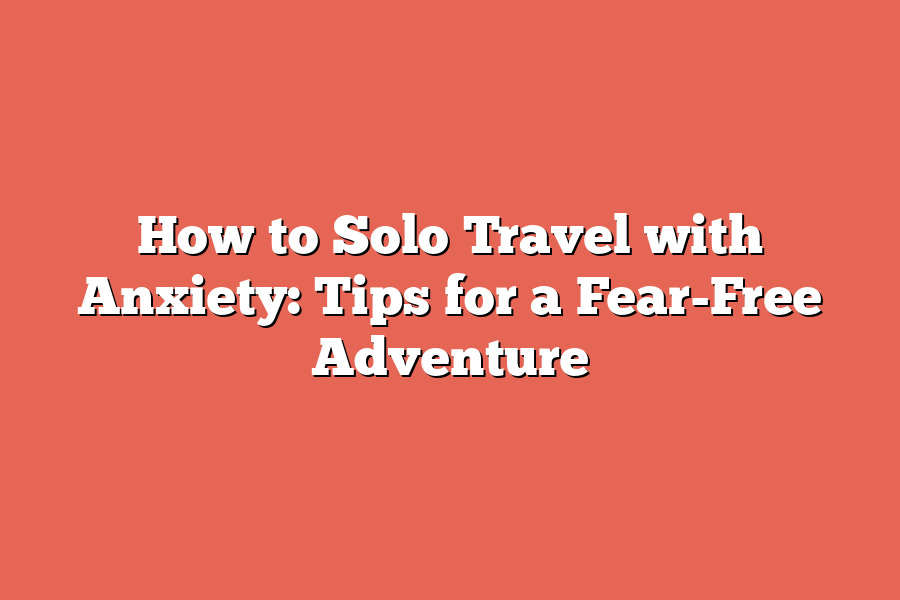Solo traveling with anxiety can be challenging, but there are several strategies that can help.
Here are some tips based on the search results:
-
Acknowledge and Accept Your Feelings: It’s important to understand that feeling anxious about traveling alone is normal, especially if it’s your first solo trip. Acknowledging and accepting your emotions is the first step to overcoming anxiety.
-
Shift Your Mindset: Try to reframe your thoughts about solo travel. Being alone doesn’t necessarily mean being lonely. Focus on the opportunities for personal growth and self-discovery that solo travel can offer.
-
Practice Mindfulness: Mindfulness techniques such as breathing exercises, meditation, or journaling can be helpful in managing anxiety during solo travel. It’s a good idea to familiarize yourself with these practices before your trip, so you can use them if needed.
-
Take Practical Steps: Plan your trip in a way that minimizes stress. This can include breaking down your trip into smaller, manageable steps, having a basic itinerary, and being prepared with safety measures and travel insurance.
-
Seek Support: Connect with other travelers, either online or in person, to share experiences and seek advice. There are many communities and resources available for solo travelers, where you can find support and encouragement.
Remember that it’s okay to take things at your own pace and prioritize self-care during solo travel.
If you have a diagnosed anxiety disorder, it’s important to seek professional help and tailor your travel plans to your specific needs.
Table of Contents
What are some effective ways to overcome solo travel anxiety?
Some effective ways to overcome solo travel anxiety include:
-
Acknowledge and Accept Your Feelings: It’s natural to have anxiety about traveling alone, especially if it’s your first solo trip ever. Accept that whatever you’re feeling is valid.
-
Shift Your Mindset: Being alone does not necessarily mean you’ll be lonely. Embrace the opportunity to enjoy your own company and take things at your own pace.
-
Plan Wisely: Choose your first travel destination wisely and break your trip down into smaller, manageable steps. Planning ahead can help alleviate some of the anxiety associated with solo travel.
-
Join Group Tours or Activities: Group tours can be a great way to meet people and alleviate feelings of loneliness and anxiety.
-
Listen to Your Intuition: Pay attention to your intuition and trust your instincts when it comes to personal safety and well-being.
These strategies, combined with self-care, patience, and a willingness to step out of your comfort zone, can help mitigate solo travel anxiety and make the experience more enjoyable and rewarding.
How can I identify and manage triggers that cause anxiety during solo travel?
Identifying and managing triggers that cause anxiety during solo travel can be a crucial step in ensuring a more enjoyable experience.
Here are some effective strategies based on the provided search results:
Identify Triggers
- Change in Routine: Traveling involves a change in routine, which can be a common trigger for anxiety.
- Fear of the Unknown: Not knowing what to expect or how to navigate new situations can cause stress.
- Unfamiliar Surroundings: Being in unfamiliar surroundings, the lack of familiarity with the culture, and the language can cause disorientation and worry.
Manage Triggers
- Coping Mechanisms: Learn coping mechanisms such as therapy, medication, breathing exercises, and grounding exercises before the trip.
- Make Beneficial Decisions: Choose accommodations and activities that suit your comfort level and expectations.
- Practice Self-Care: Get enough sleep, eat well, stay hydrated, and incorporate physical activity into your trip.
- Learn Relaxation Techniques: Deep breathing, meditation, and progressive muscle relaxation can help calm your mind and body.
- Seek Support: Don’t be afraid to seek support from friends, family, or a mental health professional. Talking about your anxiety can help reduce its intensity.
By identifying your triggers and implementing these management strategies, you can better prepare yourself to minimize anxiety during solo travel.
What are some coping mechanisms and strategies to deal with anxiety while traveling alone?
Some coping mechanisms and strategies to deal with anxiety while traveling alone include:
-
Practice self-care: Engage in activities that promote relaxation and well-being, such as meditation, setting positive intentions for your trip, taking deep breaths when feeling stressed, and eating balanced meals.
-
Identify triggers and plan ahead: Recognize the specific factors that trigger your anxiety while traveling, and plan for them. This may involve preparing a list of supportive people to contact, using relaxation techniques, and creating a battle plan for common anxiety-inducing scenarios.
-
Seek support: Connect with loved ones or a therapist for emotional support and guidance. Consider joining online forums or local support groups for individuals with travel anxiety.
-
Use distractions and affirmations: Distract yourself with activities, focus on calming images or objects, and use affirmations such as “I am safe” to calm your thoughts.
-
Consider medication if needed: If other strategies are not sufficient, consult a healthcare professional to discuss the option of medication for managing travel anxiety.
-
Engage in mindfulness and grounding techniques: Practice mindfulness, use grounding techniques, and focus on the positive aspects of your trip to stay calm and centered.
-
Plan and prepare: Plan the details of your trip in advance to reduce uncertainty and create a sense of control. This may involve researching your destination, planning your activities, and familiarizing yourself with the travel process.
By implementing these strategies, individuals can better manage and alleviate anxiety while traveling alone.
How can I make beneficial decisions, such as accommodation and activities, to reduce solo travel anxiety?
To make beneficial decisions and reduce solo travel anxiety, consider the following tips based on the provided search results:
Accommodation:
- Choose Accommodations Carefully: Opt for accommodations that offer a social atmosphere, such as hostels with communal areas, or consider shared living spaces like co-living or guest houses.
Activities:
- Plan Activities in Advance: Planning your activities can help reduce anxiety. Start with small, manageable steps and gradually build up to more adventurous experiences.
- Join Group Activities: Participating in group tours or activities can provide a sense of community and reduce the feeling of being alone.
- Engage in Socializing: Look for opportunities to meet other travelers, either through organized events or by using social apps designed for travelers.
General Tips:
- Shift Your Mindset: Understand that it’s natural to have anxiety about traveling alone, especially if it’s your first solo trip. Try to shift your mindset from feeling lonely to being open to meeting new people and socializing.
- Accept Your Emotions: Allow yourself to feel all the emotions you’re experiencing and don’t force yourself to do anything that makes you uncomfortable.
- Seek Support: Consider joining online communities or forums where you can connect with other solo travelers to seek advice and support.
By implementing these strategies, you can make informed decisions about accommodation and activities while reducing solo travel anxiety.
Remember that it’s okay to feel anxious, and taking small steps and seeking support can help make the experience more enjoyable and rewarding.
What are some tips for leaning into discomfort and managing anxiety while traveling alone?
Here are some tips for leaning into discomfort and managing anxiety while traveling alone:
-
Acknowledge and accept your feelings: It’s natural to feel anxious about traveling alone, especially if it’s your first time. Acknowledging and accepting your emotions is the first step to overcoming anxiety.
-
Shift your mindset: Being alone doesn’t necessarily mean being lonely. Embrace the opportunity to enjoy your own company and engage in activities that bring you joy.
-
Plan and prepare: Having a well-thought-out itinerary and being prepared for your trip can help alleviate anxiety. Research your destination, plan your activities, and ensure you have necessary arrangements in place.
-
Practice mindfulness: Engaging in mindfulness activities such as breathing exercises, meditation, or journaling can help manage anxiety while traveling alone. It’s beneficial to familiarize yourself with these practices before your trip.
-
Stay connected: Keep your loved ones informed about your travel plans and regularly check in with them. This can provide a sense of security and reduce feelings of loneliness.
-
Learn coping mechanisms: Identify triggers or stressors that contribute to your anxiety and develop coping mechanisms to manage them. This could include grounding exercises, seeking therapy, or engaging in physical activities.
-
Lean into discomfort: It’s important to acknowledge that anxiety may not completely disappear, but it shouldn’t stop you from pursuing your travel goals. Let your anxiety coexist with your experiences and continue to engage in activities that bring you peace and joy.
-
Start locally: If you’re new to solo travel, consider starting with local trips to gradually acclimate yourself to the experience before embarking on longer journeys.
By implementing these tips, you can work towards managing anxiety and embracing the opportunities that come with solo travel.
How can I stay safe and manage feelings of loneliness during solo travel?
To stay safe and manage feelings of loneliness during solo travel, consider the following tips:
Safety
- Stay Connected: Keep in touch with friends and family, and share your itinerary with them.
- Research: Learn about the local customs, laws, and potential risks of your destination.
- Emergency Plan: Have a plan for emergencies and know how to contact local authorities or emergency services.
Managing Loneliness
- Connect with Other Travelers: Stay in hostels or join group tours to meet other solo travelers.
- Engage in Activities You Enjoy: Pursue activities that bring you joy and ground you in familiar experiences.
- Stay in Touch with Loved Ones: Use technology to maintain contact with friends and family when loneliness kicks in.
- Practice Mindfulness: Engage in mindfulness activities such as meditation or yoga to ground your thoughts.
By following these tips, you can enhance your safety and well-being during solo travel while effectively managing feelings of loneliness.
What are some practical steps to build confidence and overcome fears about solo travel?
To build confidence and overcome fears about solo travel, consider the following practical steps:
-
Acknowledge the fear: Recognize that it’s normal to feel anxious about solo travel. Ignoring the fear can make it grow.
-
Practice makes perfect: The more you travel solo, the easier it gets to find your confidence. Start with small trips to push yourself slightly outside your comfort zone, then gradually build up to bigger adventures.
-
Forget what you “know” about solo travel: Let go of preconceived notions and mental pictures of what solo travel is supposed to look like. Embrace the uncertainty and allow your trip to unfold as it does.
-
Stop “shoulding” all over your solo trip: Avoid putting pressure on yourself with “shoulds” and unrealistic expectations. Plan and prepare, but be open to the unexpected and embrace the experience as it comes.
-
Choose a safe destination: Start by selecting a destination where you feel confident and safe traveling alone. Consider taking a guided tour for added safety and relaxation.
-
Practice being alone somewhere new: Challenge yourself to speak to strangers, ask for directions, or dine alone, even in your local city. This can help you get used to being alone in unfamiliar situations.
-
Embrace the discomfort: Lean into the discomfort of your own company, observe your surroundings, share updates with family and friends, or start a travel journal. Use the quiet time to connect with yourself and the world around you.
-
Release the fear and enjoy the adventure: Understand that fear is a normal human emotion, but it doesn’t have to stop you from taking your solo trip. Take the first steps despite feeling afraid, and embrace the freedom and opportunities that solo travel can offer.
By following these steps, you can gradually build your confidence and overcome fears about solo travel, allowing you to fully enjoy the unique experiences and opportunities that it brings.

